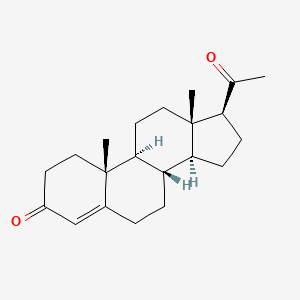m6A-centered Drug Response Information
General Information of the Drug (ID: M6APDG02570)
| Name |
Progesterone
|
||||
|---|---|---|---|---|---|
| Synonyms |
Piaponon; Pregnenedione; Primolut; Progestasert; Progesterol; Progesteronum; Progestin; Progestone; Progestosol; Progestron; Progestronol; Prometrium; Protormone; Pregn-4-ene-3,20-dione; Syngesterone; Syntolutan; Utrogestan; progesterone; Agolutin; Corlutin; Corpus luteum hormone; Crinone; Cyclogest; Flavolutan; Gestone; Gestormone; Glanducorpin; Gynolutone; Hormoflaveine; Hormoluton; Lingusorbs; Luteogan; Luteohormone; Luteol; Luteopur; Luteosan; Luteostab; Luteovis; Lutociclina; Lutocylin; Lutromone; Methylpregnone; 4-Pregnene-3,20-dione; 57-83-0
Click to Show/Hide
|
||||
| Status |
Approved
|
||||
| Structure |
 |
||||
| Formula |
C21H30O2
|
||||
| InChI |
1S/C21H30O2/c1-13(22)17-6-7-18-16-5-4-14-12-15(23)8-10-20(14,2)19(16)9-11-21(17,18)3/h12,16-19H,4-11H2,1-3H3/t16-,17+,18-,19-,20-,21+/m0/s1
|
||||
| InChIKey |
RJKFOVLPORLFTN-LEKSSAKUSA-N
|
||||
| PubChem CID | |||||
| VARIDT Drug ID | |||||
| INTEDE Drug ID | |||||
Target Gene(s) and Their Upstream m6A Regulator, Together with the Effect of Target Gene(s) in Drug Response
The target genes involved in drug-target interaction (such as drug-metabolizing enzymes, drug transporters and therapeutic targets) and drug-mediated cell death signaling (including modulating DNA damage and repair capacity, escaping from drug-induced apoptosis, autophagy, cellular metabolic reprogramming, oncogenic bypass signaling, cell microenvironment, cell stemness, etc.) could be regulated by m6A regulator(s) and affected their corresponding drug response. You can browse detailed information on drug-related target gene(s) mediated by m6A regulators.
Aldo-keto reductase 1C1 (AKR1C1)
YTH domain-containing family protein 1 (YTHDF1)
| In total 1 mechanisms lead to this potential drug response | ||||
| Response Summary | Aldo-keto reductase 1C1 (AKR1C1) is a therapeutic target for Progesterone. The YTH domain-containing family protein 1 (YTHDF1) has potential in affecting the response of Progesterone through regulating the expression of Aldo-keto reductase 1C1 (AKR1C1). | [1], [2] | ||
Breast cancer resistance protein (ABCG2)
Methyltransferase-like 3 (METTL3)
| In total 1 mechanisms lead to this potential drug response | ||||
| Response Summary | Breast cancer resistance protein (ABCG2) is a therapeutic target for Progesterone. The Methyltransferase-like 3 (METTL3) has potential in affecting the response of Progesterone through regulating the expression of Breast cancer resistance protein (ABCG2). | [3], [4] | ||
Cytochrome P450 1B1 (CYP1B1)
Methyltransferase-like 14 (METTL14)
| In total 1 mechanisms lead to this potential drug response | ||||
| Response Summary | Cytochrome P450 1B1 (CYP1B1) is a therapeutic target for Progesterone. The Methyltransferase-like 14 (METTL14) has potential in affecting the response of Progesterone through regulating the expression of Cytochrome P450 1B1 (CYP1B1). | [5], [6] | ||
Methyltransferase-like 3 (METTL3)
| In total 1 mechanisms lead to this potential drug response | ||||
| Response Summary | Cytochrome P450 1B1 (CYP1B1) is a therapeutic target for Progesterone. The Methyltransferase-like 3 (METTL3) has potential in affecting the response of Progesterone through regulating the expression of Cytochrome P450 1B1 (CYP1B1). | [6], [7] | ||
P-glycoprotein 1 (ABCB1)
Insulin-like growth factor 2 mRNA-binding protein 3 (IGF2BP3)
| In total 1 mechanisms lead to this potential drug response | ||||
| Response Summary | P-glycoprotein 1 (ABCB1) is a therapeutic target for Progesterone. The Insulin-like growth factor 2 mRNA-binding protein 3 (IGF2BP3) has potential in affecting the response of Progesterone through regulating the expression of P-glycoprotein 1 (ABCB1). | [8], [9] | ||
Methyltransferase-like 3 (METTL3)
| In total 1 mechanisms lead to this potential drug response | ||||
| Response Summary | P-glycoprotein 1 (ABCB1) is a therapeutic target for Progesterone. The Methyltransferase-like 3 (METTL3) has potential in affecting the response of Progesterone through regulating the expression of P-glycoprotein 1 (ABCB1). | [3], [9] | ||
References